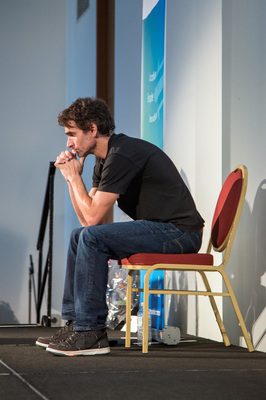By ALANA MITCHELSON
ADVENTURER and Australian-Canadian business leader Todd Sampson attributes business success to the science of “brain plasticity”.
“For years science has told us that our brains are fixed, that our brains develop until we’re about 25 and then roughly around the age of 30 there is a steady decline. Now we know that this science is false,” he told a packed room of Casey Cardinia businesspeople.
“There is no biological reason for our brains to become less flexible as we age.”
Sampson has taken it upon himself to take on the most extreme tasks to ultimately prove this theory. He has challenged himself above and beyond the perceived capacity of most ’ordinary’ people.
He has climbed a 120 metre rock-face in Utah’s Moab desert blindfolded, successfully performed a blindfolded Houdini water escape with 30 kilograms of chains and five combination locks, and completed a skywalk between two 21-storey buildings without a safety net. And he has survived to tell the tale.
“All that separates the ordinary from the extraordinary is access. The human brain has the capability to hold information equivalent to 500 encyclopaedias. Everyone can be extraordinary,” he said.
“It comes down to us challenging the series of highways in our minds and to think more creatively rather than always travelling down the same road. That’s the revolution.”
Sampson said the most important skill in business today was “mental flexibility”, a characteristic that each of the most successful people to have walked the planet have in common.
He said there were a number of ways to “redesign the brain” and improve brain plasticity including forced adaptation, visualisation techniques to improve memory capacity, and meditation to help concentration and stress.
“A great example of forced adaptation that everyone can try at home is to brush your teeth with your non-dominant hand. You’ll notice it’s a difficult task but the more you train your brain, the easier it becomes,” Sampson said.
“Lack of sleep is one of the biggest challenges. Less than eight hours a night over time reduces your IQ. We consolidate memories as we sleep and that’s when the plasticity process happens.”
Sampson described the fear he experienced during his skywalk as “excitement without breath”. He emphasised the importance of controlling anxiety in not only the business realm, but all aspects of life to achieve the best outcome.
“The brave are not without fear. The part of the brain responsible for fear – the amygdala – is not born blank,” he said.
“We all live with levels of fear and anxiety. But it can be managed to the point where fear is no longer an issue.”







